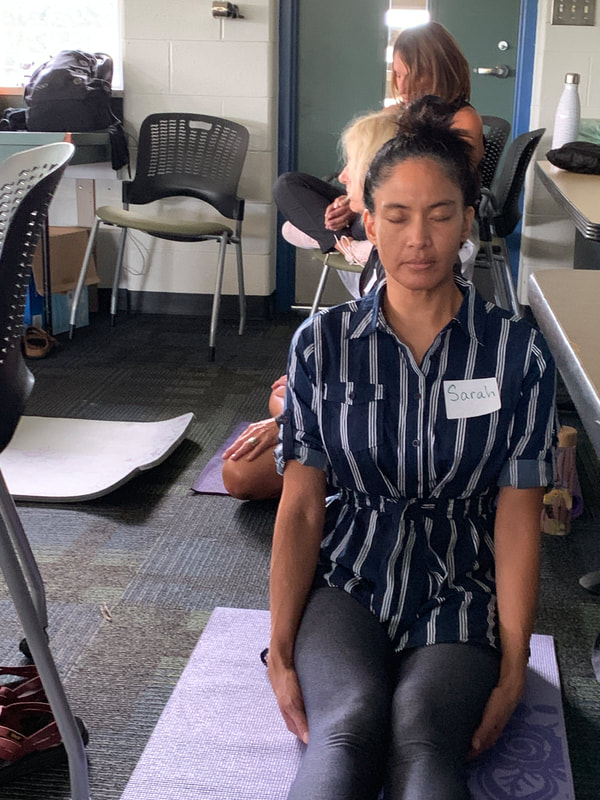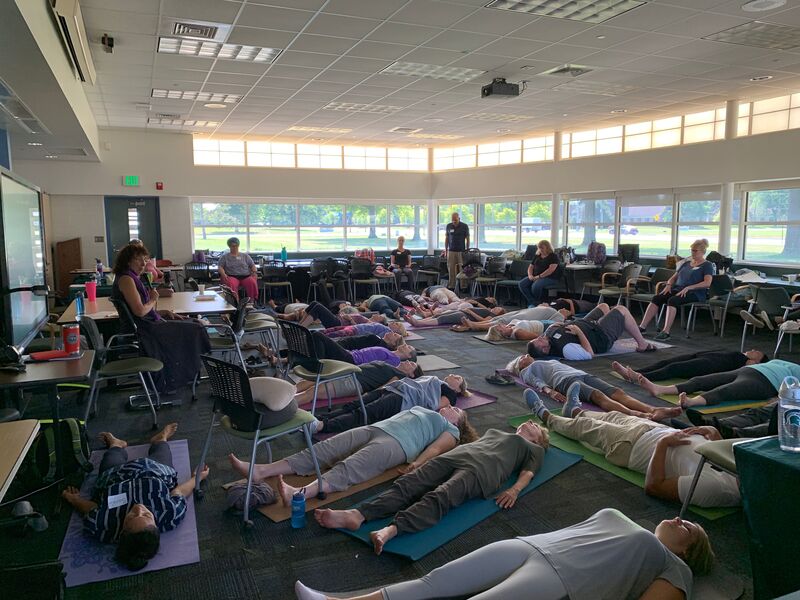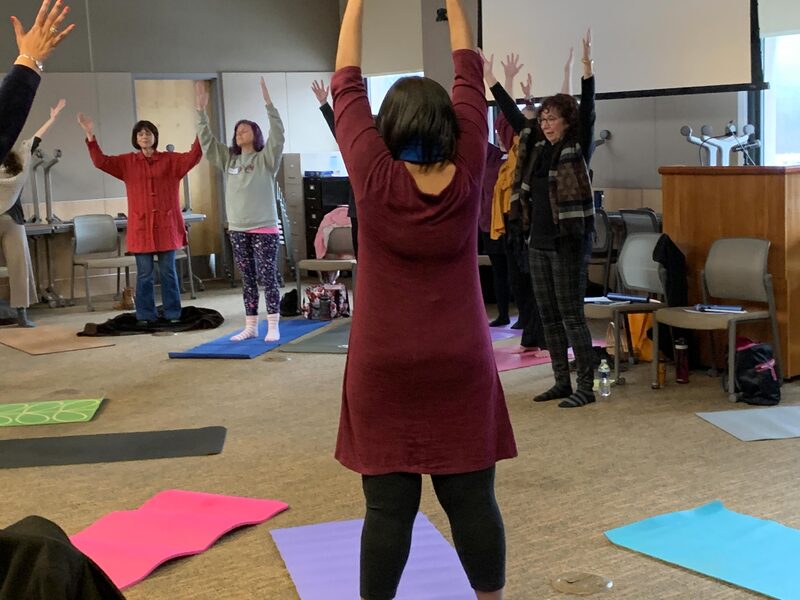Best practice recommends that only when educators are proficient in their own understanding and have begun to engage in regular mindfulness practice can they be most effective and authentic in teaching and adapting mindfulness practices in a developmentally appropriate manner to their students. The courses below focus on developing skills in this manner. In-depth training with techniques to teach mindfulness skills to students are offered in our summer training intensive program once educators have personal experience in mindfulness practice.
Mindfulness Skills for Educators:
Enhancing Self-awarenEss, Self-care and Stress-reduction
22 hrs, 8–25 Participants
Enhancing Self-awarenEss, Self-care and Stress-reduction
22 hrs, 8–25 Participants
|
22 hour curriculum
|
The everyday stresses of teaching are well documented, and take a toll on health and well-being. Learning mindfulness practices can help build resilience in and outside the classroom. Through this 22 hour course, educators have opportunity to gain skill in navigating their emotions and thoughts, managing stresses arising from teaching and maintaining life-work balance.
Program content focuses on:
The curriculum includes a series of eight consecutive weekly class sessions of 2 hours in length, with each session building upon the previous learning. In addition, a half to full day session to practice integration of these mindfulness skills is also required. A central objective of this course is to facilitate participants’ capacity to begin to develop their own mindfulness personal practice. Course participation requires a commitment to attend all classes as well as the-full day session on a weekend day. The content includes experiential mindfulness activities (e.g. concentration of the breath, gentle movement, etc.) and group discussion. Audio-recordings for home practice and written materials are shared at each session to help reinforce and sustain learning. Regular follow-though of out of class practice is expected. The content of the curriculum for this course has been adapted from several evidenced based programs, including Jon Kabat Zinn’s renowned program of Mindfulness Based Stress reduction (hyperlink), Kristin Neff and Chris Germer’s Mindful Self-Compassion course and Passage Works’ Stress Management and Relaxation Techniques in Education™ program. Benefits derived from this course are directly related to the individual amount and commitment to participation. Educators who complete this course find the skills learned to be of enormous benefit. “In working with the most difficult students, it has helped me improve my patience, and my not being judgmental; it increased my compassion for my students.” “I now use and practice mindfulness everyday. It may be only for a moment, It may be for 20 minutes, but I see, feel, differently. this has been the best experience of my life.” “The skills taught are wonderful in my school life and personal life. It has created a seamless mindset for my life as an educator, wife and mother. We must develop next steps for districts, starting with administrators and support staff.” READ EXAMPLE EVALUATION |
Building Foundational Skills in Mindfulness
12 HRS, 8–25 participants, PRE-REQUISITE REQUIRED
12 HRS, 8–25 participants, PRE-REQUISITE REQUIRED
|
12 hour curriculum
|
This 4-week course builds on the one day pre-requisite workshop offered on Self-Care for Educators: A Day-long Introduction to Mindfulness and Self-Compassion . The major objectives of this course are to facilitate participants’ capacity to begin to develop their own personal mindfulness practice, experience how mindfulness brings forth insight into their relationships and cultivate emotional balance.
During ordinary school life, teachers and intervention staff are continuously confronted with situations that require them to maintain their equilibrium and sensitively respond to the diverse social, emotional and academic needs of their students. When educators understand and know how to regulate their own emotions through regular practice, they become more capable to integrate and teach from the inside out. By building the foundation for applying mindfulness, educators will gain more clarity of mind in real time when under stress, be able to extend greater compassion and kindness to themselves, their students and loved ones, develop more caring relationships, and meet their students’ needs more effectively This training consists of four 2-hour weekly sessions and a half day practice session. Each class session will consist of experiential practice, coupled with discussion and relevant didactic evidence based information. Home practice and assignment of activities to reinforce application in the real time at home and school will be expected. Access to audio recordings for home practice will be provided as well as a packet of handouts. The central themes woven throughout this training involve:
Content material for this course is derived from evidenced based mindfulness programs which have an extensive body of research behind them (e.g. MBSR) and from more newly from mindfulness programs conducted specifically for educators. It is important to note that this course is focused on developing educators’ insight into the application of mindfulness in their life and classroom. It is important to note is that participation in the course involves a commitment by educators to attend all four weekly 2-hour classes and requires they have attended the previous day-long self-care program Self-Care for Educators: A Day-long Introduction to Mindfulness and Self-Compassion . |
Deepening Teacher Mindfulness Practice Series
4–6 HRS, 8–25 PARTICIPANTS, PRE-REQUISITE REQUIRED
4–6 HRS, 8–25 PARTICIPANTS, PRE-REQUISITE REQUIRED
|
4 hour curriculum
|
This course consists of four 1 or 1 1/2-hour after school sessions geared to deepen teachers’ practice experience in mindfulness and to help them respond with less reactivity and more compassion for themselves, colleagues and students. Each session focuses on a topic: mindfulness of communication, mindfulness of diversity and racial equity, mindfulness of difficult emotions (fear, grief, trauma) and forgiveness. This course may be offered once a month after school following one of the requisite foundational courses – Mindfulness Skills for Educators: Enhancing Self-Awareness, Self-Care and Stress-Reduction or Building Foundational Skills in Mindfulness.
|
Summer training intensives are offered to learn how to apply mindfulness training to youth. Summer intensives are available to educators and professionals only after fundamental skills development has been acquired through the courses above or other comparable learning programs.
SUMMER INSTITUTE: TEACHING MINDFULNESS TO YOUTH
15 HRS, 100 PARTICIPANTS, Pre-Requisite ReQUIRED
15 HRS, 100 PARTICIPANTS, Pre-Requisite ReQUIRED
|
15 hour curriculum
|
This 15 hour training intensive is offered annually in-person or online in the summer by MC4ME instructors. It is designed for educators and professionals with established experience in the personal practice of mindfulness and who wish to translate its application to youth in the classroom or clinical setting where they work. The training is scheduled over the course of a week in 4 half-day segments or two full days. Throughout the training, instructors first model specific mindfulness activities to be used with elementary, middle- and high-school students, including those with special needs, and then invite participants to explore teaching these activities with their peers, using provided scripts and handouts. Selected activities that are demonstrated are adapted from evidence based curricula and include those which the instructors have found to be most helpful in encouraging students:
With feedback from their peers and instructors, participants reflect on ways to hone their skills, and deal with anticipated challenges in teaching that may be shown by students, parents, colleagues or school administrators. Participants receive guidance on how to seamlessly incorporate mindfulness informally throughout the school day using a trauma sensitive approach. In 2020, particular attention is paid to adapting mindfulness instruction to online learning and emerging hybrid k-12 models. To facilitate implementation of mindfulness instruction once school begins, participants are also offered the option to participate in two to three monthly follow up group coaching sessions. Educators find this course to be be of great value. “You created a caring community. I loved all of the practices. There are so many resources out there that having them curated and demonstrated helped me be more willing to try them. Your gentle ways created no judgment for me.” “Packed with tools, excellent trainers, great pace and combination of theory and practice.” “High quality, loved the guided practice, loved the "role play" and feedback. I increased my understanding and appreciation for the need to maintain my own daily practice and also to include it in my daily time and work with my home and work families and colleagues.” |
Mindfulness saved my life! The training impacted my life both personally and professionally. I am more aware, and able to focus without the stress. I use the strategies throughout my day. I am constantly bombarded with stressful phone calls, emails, and emotionally charged meetings. Using the mindfulness strategies has allowed me to handle anything that comes my way without becoming overwhelmed. It was a life changing experience.”
– Special Education Director, Southfield Public Schools





